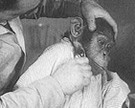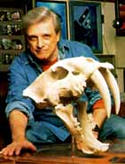11/29/00
On writing...
If you know a writer, either an established one, or one that is struggling to get their first short story published, stop reading right now, go find that writer, and give them a hug.
Make this "Hug a writer day."
Because we need it. Really, really badly.
True, we don't lift anything heavier than The American Heritage Dictionary, or in darker times, a bottle of JD, but we toil alone at all hours of the night, trying to figure out whether to use "who" or "whom." And then, after we've gone to bed satisfied that we cranked out three or four satisfactory pages, we lie awake at night wondering if Sheila the Bartender is a convincing villain or whether we should have actually used that "who" instead of "whom." And then we fret about whether we'll remember to change that in the morning of if we should get up right then and there to make the edit.
We have absolutely no right to bitch about what is essentially a job (or hobby) that involves sitting, tapping away at some keys, and then proudly proclaiming that you are part of The Literary Establishment. And the fact that we have no right to bitch fills us with even more self doubt, even more suspicion of our lofty aspirations, until we convince ourselves that we would fuck up the subject-verb agreement of a grocery shopping list.
Brains that are particularly overactive tend to run and run until they fall into into what computers do when they lock up sometimes — create an infinite loop. The writer gets excited about a project. Then the writer starts to write it. Then he (or "she" if she is lucky) starts to realize it's not as good on paper as it was in their head. Then they start to doubt what they once thought was their God-given ability. Then they either drink, get frustrated or go play Quake III. And those are the non-self-destructive writer types.
It's not that we like being alone and obsessive and tortured. If writing were as simple and methodical as working in fast food (and yes, I have done both as a living), we'd all be whipping out a novel every four months. It certainly doesn't pay as well as fast food in most cases unless you're Michael Crichton or Tom Clancy.
But because it is a mental activity, one that relies on giving a portion over to your subconscious in the fugue-like state that produces some of the best fiction, there is a certain amount of fear involved going in.
Like a lot of writers, I have some rituals before I start writing fiction. The door has to be closed. There has to be music on (Right now, Elastica and PJ Harvey are good motivators). A glass of something to drink has to be on the desk to keep me from using a refrigerator run as an excuse to stop writing. (Right now, it's V-8 Splash Citrus Blend. Highly recommended.)
But they're really all just tricks to get your mind into the mode to open up.
Here is how we fake ourselves out:
About three weeks ago, I got the idea for a novel I wanted to write. It would begin with the suicide of a teenager, a subject I don't know much about. Other elements would be introduced — the events leading to the suicide, the aftermath, and the actions, some desperate, that the characters around that character take after it happens.
I got really excited about this. I started to write the first bit of it. I sketched in my head a point B. For me, having a Point A and a Point B in the middle gives me a goal for the first half. By the time I get to Point B, I can usually figure out what's going to happen toward the end and start writing toward that. That's how the Heather and Gina story, .Gina, worked out.
But then I started to doubt. I don't know anything about teen suicide. How am I going to write from the point of view of the mother of a suicide victim? Who were these characters and why did they act that way?
I began to fake myself out, beginning to believe this wasn't something I was capable of writing. I started to have more and more ambitious ideas about the structure of the novel. I decided the novel would be written in fragments — some news stories, some pieces of journals including one written by the dead teenager before his death, fragments of quickie books written about the tragedy when the events following the suicide bring it national attention.
Suddenly, this wasn't a simple little story. This was a huge, epistolary novel about suicide, race, corporate culture, and ultimately, love gone awry. Shit. How do I do that?
And then I decided I couldn't write it. I sat down, and nothing came out. Everything I wrote felt boring and wrong. Where were the interesting scenes? Was this going to be as depressing and humorless as it felt?
Shit.
The story got too big in my head and none of it seemed to fit on the page. Infinite loop.
So I decided on Sunday to write something smaller, simpler and more direct. A simple narrative, and a genre I was very familiar with: a horror story.
Last night I finished page 11 of this new story, and had to stop myself to work on Terribly Happy. There is a Point B in sight (a doozy of a Point B, in fact), and the characters feel more real and alive to me than any of the ones from the suicide novel did in my head.
|
Harlan Ellison with some teeth |
I'm not sure what I've learned from this, except that writing is much more of a solo head game than I was ever taught to expect. The very instrument you trust (the brain) can choose to go out to lunch when you need it most. Tricking it is not easy, but when you convince it that something is easier or less work (even when the opposite may be true), it can surprise you.
There's a story by my favorite writer Harlan Ellison. It's called "Working with the Little People." I just pulled Strange Wine, the collection of short stories it's part of, from the bookshelf.
The story is about a writer who writes a few stories about Tolkein-esque about elves and whatnot. He earns a modicum of fame. Then suddenly, one night, he runs out of ideas:
"In the month of August, on a Friday night — the 20th to be exact —at twenty-three minutes to midnight, to be tedious about it — Noah Raymond ran dry. That simply, that easily, that directly, that horrifyingly, he ran dry... He thought for the better part of an hour, and the only idea that came to him was about a mad, one-legged seaman hunting a big white fish. He thrust the idea from him forcibly; it was redolent with idiocy.
For the first time in his life, from the first moment he realized he had the gift of storytelling, the magic gift of stringing words together so they plumbed the human heart, he was empty of new thoughts. No more strange little fables about the world as he wished it to be, the world that lived in his mind, a world peopled by characters full and firm and more real than those with whom he had to deal each day. His mind was a vast, empty plain without structure upon it or roll to its topography. . . with nothing in sight but gray vistas that extended to limitless horizons."
That is about the most terrifying thing I can think of for a writer. And unlike a boil that can be cut away or a boulder that can be pushed away, this block is in your head. You can't physically do a damn thing about it but find a way to psyche yourself out of it.
In the story, a bunch of little Cockney elves come out of Noah's typewriter and start writing his stories for him, saying that if he stops producing stories about elves, their race will start to die out from people not believing in them. Trust me, it works really well in the story.
The twist is that they're not writing fiction at all. They're just writing down the history of elves because they don't have the capability of imagination. What finally cures Noah's writer's block is when they finally run out of stories and tell him something unbelievable: elves have stopped believing in humans, and soon we're going to start disappearing.
So Noah sits down at the typewriter and begins writing the story of humans, starting with the creation of Earth.
It's as apt a metaphor as I can reference to the mind games writers play for the sake of production.
When we convince ourselves that the drying well we draw inspiration from isn't a well at all, but a vast ocean... that's when we can believe in magic, transform the world and believe in the power of words.
But mostly we just get frustrated, ball up wads of cheap bond paper, and take out our self loathing on those around us.
It's natural, really.
And that's why we need those hugs.
 |
|||||||
 |
 |
||||||
 |
|||||||
 |
|||||||
 |
|||||||
 |
|||||||
 |
|||||||
Clip
Art Corner

Next time you shave with a Mach-3 Razor, do not forget the sacrifices
many brave monkeys made in its development.
